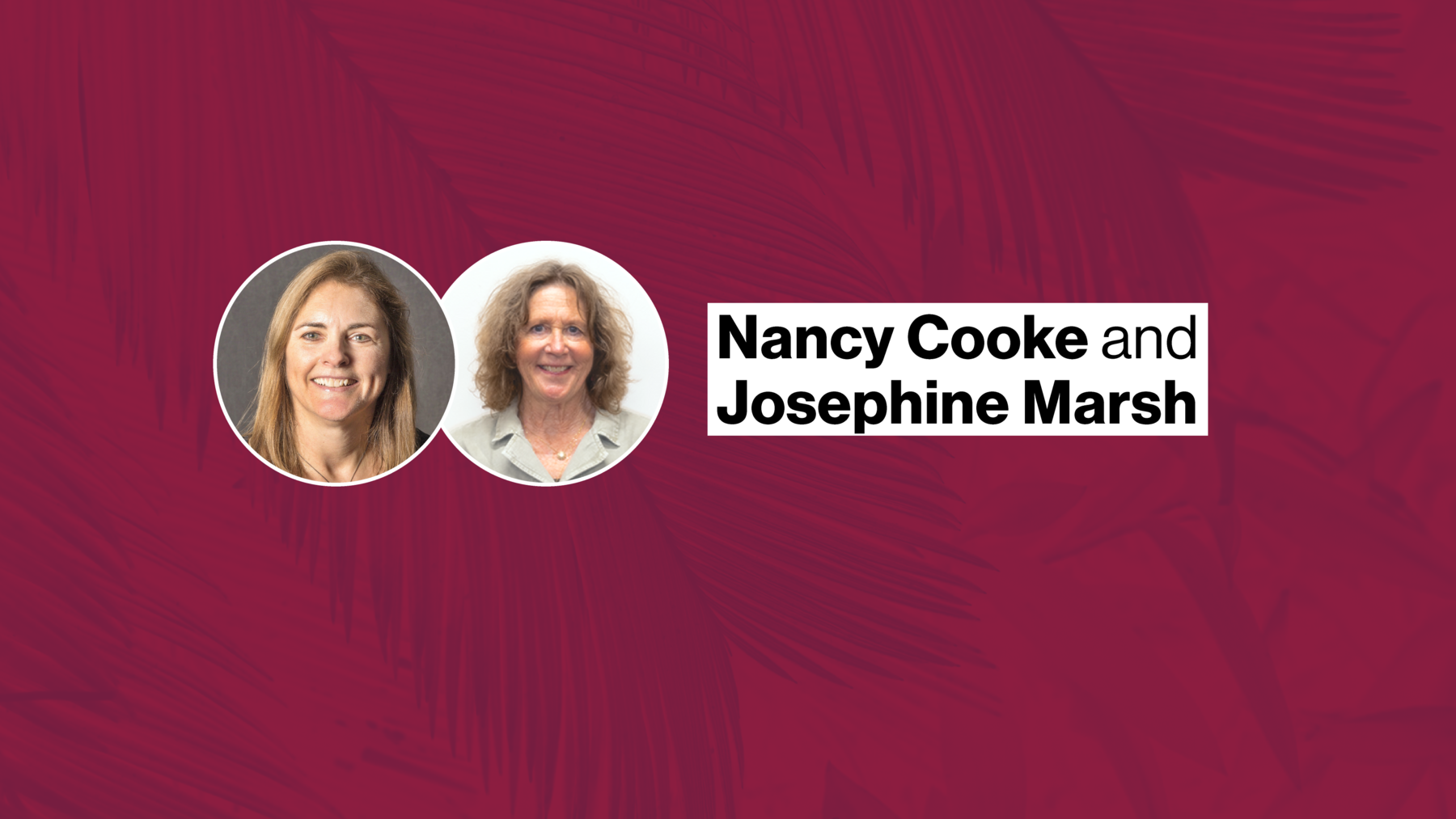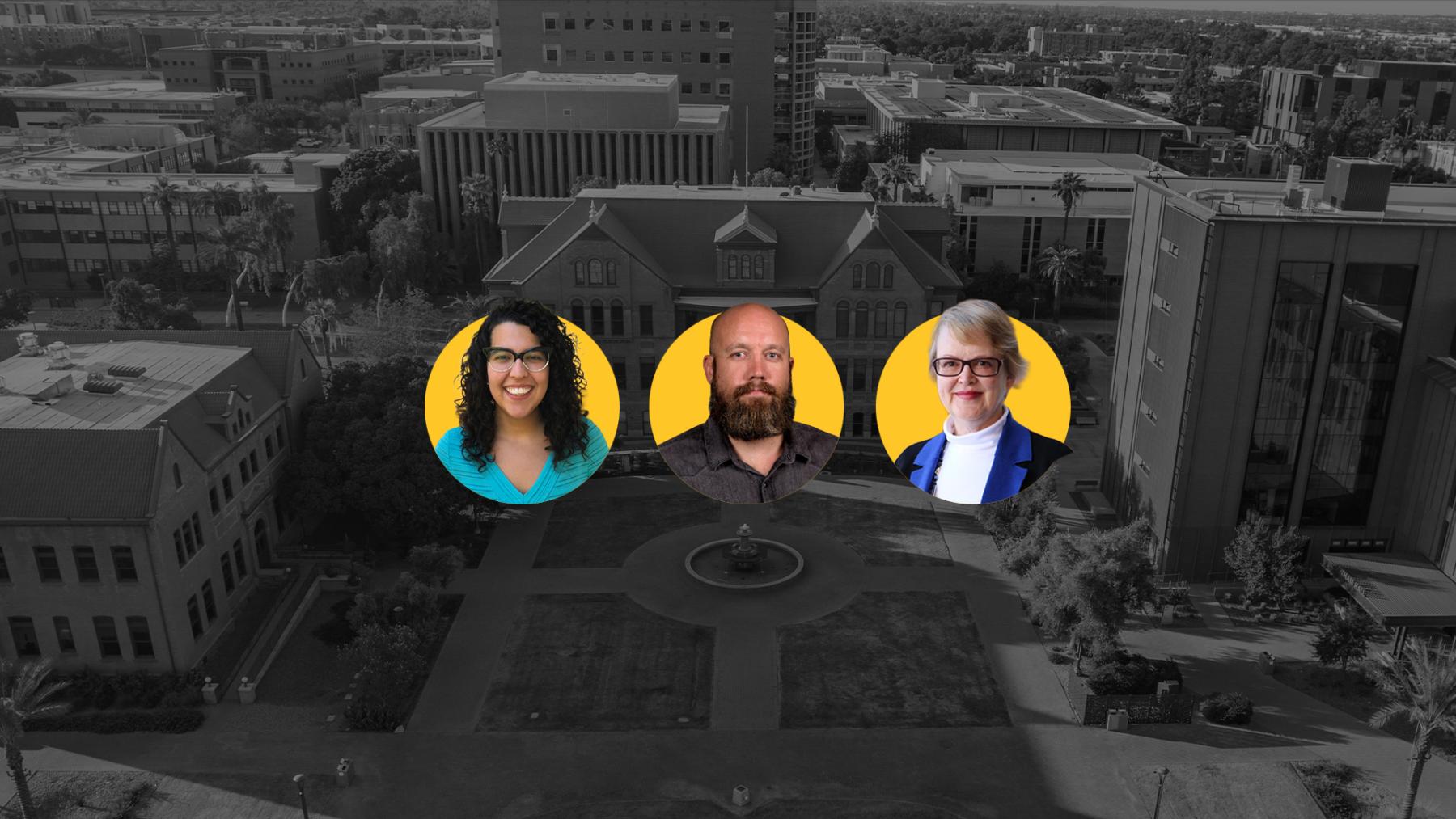
Rewriting the rules: Two Faculty Fellows champion collaborative dissertations at ASU
Graduate education is evolving, and two Faculty Fellows at Arizona State University's Graduate College — Nancy Cooke and Josephine Marsh — are leading efforts to transform the traditional dissertation model. With their diverse expertise and a shared passion for innovation, Cooke and Marsh are exploring how collaborative, interdisciplinary research can redefine graduate education and better prepare students for the challenges of academia and beyond.
Nancy Cooke, a professor of Human Systems Engineering, brings a wealth of experience in team cognition and human-AI-robot teaming. Her work spans defense operations, healthcare, and cybersecurity, often addressing high-stakes environments such as space missions and military operations. Cooke's involvement as a Faculty Fellow began with a pivotal conversation with Vice Provost and Dean Elizabeth Wentz, who asked whether ASU might be doing a disservice to graduate students by not offering sufficient opportunities for interdisciplinary collaboration, including collaborative dissertations. For Cooke, this question resonated deeply, "ASU should be leading on this issue," she said. "The more we dig into this problem, the more important I think it is and I am excited about the potential impact of our work."
Josephine Marsh, an associate professor of literacy education, was similarly drawn to the Faculty Fellow role through a conversation with Assistant Vice President of Graduate Education Brian Mattson. Marsh's adolescent literacy and teacher professional development background had already shown her the power of collaborative learning. She questioned why students in ASU's Doctor of Education Program couldn't pursue collaborative dissertations, even when their research aligned meaningfully. Her desire to explore this untapped potential for collaboration laid the foundation for her Faculty Fellow initiatives.
Cooke and Marsh joined forces this semester to develop a survey assessing the need for collaborative dissertation opportunities at ASU. They aim to gather data on existing practices, identify gaps and highlight best practices at other institutions. The duo also plans to interview faculty members across ASU and beyond, digging deeper into how collaborative dissertations can be successfully implemented. "The possibilities of alternatives to traditional dissertations are exciting," Marsh said, noting that their work has opened new avenues for rethinking doctoral education.
Both Fellows emphasize that team science — conducting research in interdisciplinary teams — is critical in addressing today's most pressing challenges. Cooke highlights that problems like climate change and mental health crises often require collaborative solutions that integrate diverse expertise. "Conducting science in teams can be challenging but when it works, the results are novel and impactful," she explained. Marsh echoed this sentiment, noting that misconceptions about team science often hinder its adoption. Some faculty and students mistakenly believe that collaborative dissertations lack rigor or do not prepare students for professional success, a notion both Fellows are determined to dispel.
The personal motivations behind their work are just as compelling. Cooke's research on human-AI-robot teaming is driven by a belief that technology can — and should — function as a teammate rather than a tool. She compares the dynamic between humans and animals, such as search-and-rescue dogs and profoundly engages in the ethical considerations of trust and design in AI systems. Meanwhile, Marsh's passion for literacy education stems from her early career as an alternative high school teacher. Concerned with her students' struggles with reading and writing, she pursued a PhD to understand how to support better literacy engagement, a commitment she now extends to educators through her research.
Their work as Faculty Fellows has already sparked excitement about the potential for collaborative dissertations to enrich doctoral education at ASU. As they look ahead, both Cooke and Marsh are focused on analyzing the data they collect, synthesizing findings and crafting a set of best practices to guide future initiatives. Their ultimate aim is to make ASU a leader in team science and collaborative research opportunities, setting a new standard for graduate education.
Outside their professional roles, Cooke and Marsh find balance in their personal lives through activities that keep them grounded. Cooke enjoys cooking, hiking, weightlifting and the occasional hot air balloon ride, while Marsh finds solace in reading fiction, binge-watching TV shows, and taking long walks. These hobbies reflect the thoughtfulness and creativity they bring to their roles as Faculty Fellows as they work to create a more inclusive and innovative academic environment for future scholars.
By challenging traditional norms and embracing the transformative power of collaboration, Cooke and Marsh are helping to shape the future of graduate education, proving that the best ideas often emerge when great minds work together.
More stories from the Graduate Insider

Graduate education is an adventure
About eighteen months ago, I set out on a journey walking the islands of the Dodecanese during a sailing trip in Türkiye and Greece with several friends. Along the way, I found winding paths, timeless villages and breathtaking views of sea and sky. That experience got me thinking about how adventure shows up in other parts of life, especially in learning.

Promoting resilience and well-being in Ghana — and across the globe

From practice to presentation: How to deliver a winning faculty job talk
Giving a job talk can feel like the most high-stakes presentation of your academic job search. It’s not just a research seminar—it’s your opportunity to demonstrate vision, communication skills, and fit within a department. In a recent Lunch and Learn, faculty members Associate Professor in School of International Letters and Cultures, Anita Huizar-Hernandez, Professor in School of Life Sciences Jeffrey Jensen, and Professor in Department of Physics Patricia Rankin shared concrete strategies to help graduate students and postdocs succeed as future faculty candidates.